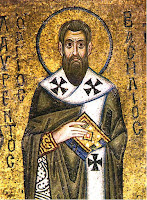Saint Basil the Great, Homily no. 2 on the Theophany (or Epiphany, otherwise known as the homily In sanctam Christi generationem, On the holy birth of Christ) 6, as translated (for now) here. Greek from p. 857 col. 1B of the 1839 De Sinner ("apud Gaume") reprint of the Garnier (or Maurist) edition of the Opera omnia of 1721-1730. For a comment on the "technical" superiority of this edition, see p. 31 n. 5 of Mark DelCogliano, "Tradition and Polemic in Basil of Caesarea’s Homily on the Theophany," Vigiliae Christianae 66, no. 1 (2012) (where the CPG's revised position on its authenticity is also noted), and of course the latest (2022) edition of the ODCC. Holman and DelCogliano, by contrast (St. Basil the Great On fasting and feasts, Popular patristics series 50 (Yonkers, NY: St Vladimir's Seminary Press, 2013)), translate the edition of Luigi Gambero (L'omelia sulla generazione di Cristo di Basilo di Cesarea: Il posto della vergine Maria, Marian studies library 13-14 (Dayton, OH: University of Dayton, 1981-1982), 177-200). Their translation of this sentence, on p. 39, runs as follows:
No longer are you dust and to dust you shall return; rather, joined now to heaven, you shall be taken up into heaven.
My thanks to Dr. Matthew Milliner for the Facebook post that introduced me to this passage.


.jpg)
